
RPGamer was invited to be a part of a roundtable Q&A with several Kingdoms of Amalur: Reckoning developers, including former Bethesda luminary Ken Rolston. We were able to ask a number of questions that were inspired by gamers' experiences with the Reckoning demo, as well as some general questions about the setting and gameplay. Here is a summary of the things we learned.
On Fate and Destiny:
Fate and destiny play into both the game's storyline and its mechanics. In terms of the story, the main character is the first mortal in the world to have awakened from the dead. Everyone else in the world has a deterministic fate that they cannot escape, but the player character has been released from fate via resurrection. This provides a lore-based rationale for why the main character is special.
In terms of gameplay mechanics, the Destiny system allows players to choose their own fates by picking from any class that's available based on the abilities that the player has chosen. There's also the Fate Shift mechanic, which allows the player to store up fate via defeating foes in combat. When the fate bar is full, a Fate Shift can be executed, making time slow down for the enemies and making the player powerful.
It seems like the Destinies involving the Might and Finesse trees have fewer interesting special abilities associated with them than those that involve the Sorcery tree. What is the development reasoning behind this? Why so many Destinies that just give passive bonuses?
For the Might tree in particular, the team wanted to cater to players who didn't want to be overwhelmed with buttons to push. Rolston suggested that this doesn't make Might less interesting, but rather involving less user management, allowing the player to get on with mastering the game's main combat system. It was also mentioned that many of the items on the cards may not sound interesting when they're simply read about, but turn out to be lots of fun in gameplay terms.
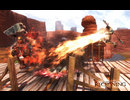
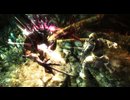
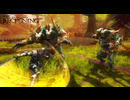
What are some of the most unique features of the Amalur setting?
There are a lot of unique and fascinating things about the setting that the team can't tell us about yet, as they are considered "franchise secrets." R.A. Salvatore really did write ten thousand years of history, and there's a huge lore bank that the developers have needed to reference and stay consistent with while developing Reckoning.
The game itself should give the players some hints and whispers of the world's bigger secrets, and these secrets are designed to be revealed throughout a lengthy series of games made in the setting.
[Ed: As this article was being written, we learned that a single-player sequel to Reckoning has already been confirmed, so 38/Big Huge appears to be following through on this promise.]
What is the main feature of Reckoning that makes it stand out in the market?
The combat system is the biggest area in which Reckoning hopes to innovate. Other major WRPG developers have done very well in the other main pillars of RPG development: exploration, achievement, and narrative, but the team felt that nobody had quite nailed down a truly entertaining combat system.
Big Huge Games was a good company for this job, as it is very focused on user experience. The Reckoning team focused on "discoverability" in the combat system—players will discover neat combinations and tricks simply by playing around in combat, such as the ability to juggle foes in the air with a longsword combination. Tactical movement is another important part of the combat system, allowing players to use the dodge ability to move quickly around the battlefield. This setup allows the game to present situations such as being surrounded by enemies, because the player has the tools to deal with it.
Lest non-twitch players become worried about the combat system, the team was quick to note that Reckoning is a true RPG, and combat skills alone don't allow the player the win the game. Characters will need to kit up with improved gear and make good use of the skill choices that are made during levelling. The combat system is also designed to be accessible, so that gamers of varying skill levels will be able to find a playstyle that suits them.
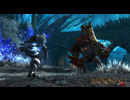
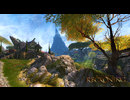
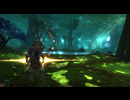
How does the player's race selection influence the gameplay experience?
The biggest impact that racial choice has on the character is that each race has its own set of ability bonuses that it starts the game with. Rolston's favourite race is the Varani, who have bonuses to Detect Hidden, Lockpicking, and Mercantile.
Racial choice doesn't affect the narrative of the game. The developers didn't want racial choice to lock players in or out of any content, and wanted the questline choices that the player makes to be the thing that NPCs react to, not the cosmetic racial choice from the beginning of the game.
Is it possible to forget the main quest and just go off adventuring in the world?
The main quest will be obviously signposted, so players won't accidentally lose track of it. It's not compulsory, however, and there are a ton of faction and other quests to undertake. There is no "gating," so the player never has to complete any particular portion of the main quest in order to go to a new area of the world.
The player can make a lot of choices about the main character's story, but how much can we affect the world around us?
There aren't a lot of destructive branching paths in the story that lock the player onto a certain path or close off things in the game. Rolston used to think that forcing characters to make these kinds of choices was innovative game design, but he now sees them as too limiting. There are lots of choices in the game, but the consequences of the choices won't lock the player out of content. Players will be able to complete all the faction questlines in a single playthrough of the game if they so choose.
This speaks to the game's replayability as well. The game was designed in such a way that the player can replay it if they desire, but can also experience all the game's content with a single character. The ability to respecialize at will even allows players to experiment with the different Destinies and combat abilities on a single character.
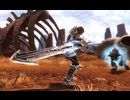
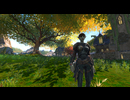
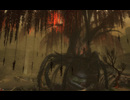
Tell us something great about the game that we couldn't see in the demo.
There's some epic music that accompanies the boss fight at the end of the Well of Souls, but it couldn't be heard in the demo. Also, players are in the shallow end of the combat pool during the demo, and the combat system only becomes more fun and engaging as the game goes on. There are some epic boss fights with unique mechanics that can be found later in the game.
High-level crafting is also interesting. There are interesting gems that the player can socket into gear, for example a gem that has different effects during daytime and nighttime. Finally, the team is anxious to have us experience the areas beyond the heavily-wooded Dalentarth. When players emerge onto the plains, for instance, they suddenly have a wide view of the world stretching out in front of them.
Why can't we jump?
The team tried various different traversal options while working on the game, and decided that jumping didn't work well with the game's design. Rolston understands that jumping can add immersion, but doesn't think that, say, jumping up a mountain for twenty minutes is the height of gameplay excitement. The ability to jump also adds complications to the combat system.
Instead of the ability to jump at will, players should find that they are able to make their way to anything interesting in the game with their feet planted firmly on the ground. The team itself is still split on the jumping issue, and they understand that it's a controversial topic amongst fans.
Open world games can be plagued by inconsistent voice work. How has the Reckoning team dealt with this issue?
Voice work is a huge management issue, so the team took on the challenge of ensuring that they had all the lines they needed for the game. It helps that they had plenty of QA time and a strong team of voice actors.
Will there be a toolset release so that we can make mods?
As Reckoning is the first game in the franchise, the tools aren't in a state that allows them to be released to the public at this point. That said, the team is working on a PC release of a toolset with basic functionality to aid modders.
Are there plans to implement more game options in the PC version such as increasing draw distance or setting the default camera following angle/distance?
There are no plans to distinguish the PC version from the console versions in this way.
How come we can't play gnomes? They're adorable!
Beyond the obvious technical/modeling/animation hurdles that would make playable gnomes far too much work, there are apparently "franchise secret" reasons why a gnome can't star in this game.
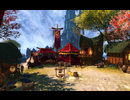
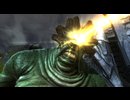
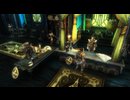
We would like to thank Electronic Arts and 38 Studios/Big Huge Games for giving us this opportunity to pick their brains and whine about the lack of a jump button. We are not entirely certain if we would like to thank Mr. Rolston for serenading us with "Pretty Gamers," but we certainly thank him and his teammates for their time and answers!
|









